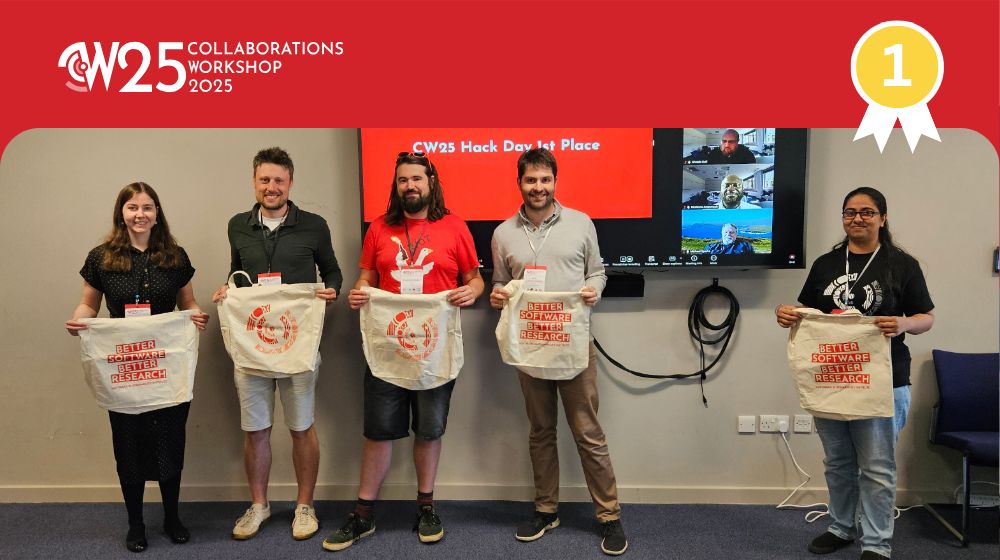Hack FTW

I’ve not posted on my blog about this, but I recently joined the University of Manchester. I’m an SRSE based in the Department of Physics and Astronomy, working across 2 projects. One is a “Pump Prime” project in green compute, the other is software engineering focussed as part of the EVERSE project. This latter project is a collaboration with the eScience Lab - of which I’m also a member. This blog post is from that perspective :-)
Collaborations Workshop
The Collaborations Workshop, is organised annually by the Software Sustainability Institute. It brings together researchers, software developers, data scientists, and academics. This explores and develops best practices in research software, fostering collaborative projects.
Collaborations Workshop 2025 (CW25) was held at the [University of Stirling]. This was in the beautiful surrounds of Scotland; many also attended remotely/hybrid.
I recently participated in CW25. A last-minute change of plans meant I joined the annual event online. This included taking part in the workshop’s Hack Day activities.
Hack Day Project: “Green Metadata”
During the CW25 Hack Day, I joined a team of researchers and Research Software Engineers. We prototyped a new format dubbed “MetaGreenData” or “Green Metadata”. The team included my colleague Professor Caterina Doglioni (from Manchester University’s Physics deprtament). The full team included: Loïc Lannelongue, Christina Bremer from the Green Algorithms team alongside Will Haese-Hill, Jyoti Bhogal, Duncan Leggat, Caterina Doglioni and myself (Michael Sparks).
Our goal was to describe the environmental impacts of computational research. So we defined an initial standardised metadata format. We wanted this to be human friendly and machine readable. That led to a decision to use YAML. We want to support transparent reporting of research computing impacts. For example across journals, funders, and research projects. So it supports consistently capturing information such as energy usage and carbon emissions.
In developing the Green Metadata prototype, we drew on existing community standards. The approach was inspired by formats like the Citation File Format (CFF) and CodeMeta. CFF is used for citing software and well supported. The proposed environmental metadata structure is also grounded in relevant ISO and AFNOR specifications for sustainability. This ensures that it aligns with established guidelines for reporting environmental impact.
What was created
The hack day lasted just seven hours, providing a tight timeframe for development. In that short time, we created initial versions of the following:
- A literature review summarising relevant sustainability standards
- An initial green metadata schema definition
- A browser-based Green Metadata metadata creation tool (using pyscript)
- A Django-based platform designed for longer-term use and potential data correlation across projects
As a result we had an end to end solution which could be used immediately to gain feedback and iterated on.
Outcome and Next Steps
The Green Metadata project was awarded first place among ten teams at the CW25 Hack Day.
The Software Sustainability Institute highlighted the win publicly on its LinkedIn page. This highlights community support for standardising sustainability information. This success builds on the University of Manchester’s ongoing green computing efforts (particularly within Physicsand the EVERSE project). It also provides momentum for further work on the concept.
Extending this Green Metadata prototype will continue over the coming months. This will involve from students and collaborators at the University of Manchester, the University of Cambridge, and beyond. We plan to refine the metadata format and explore its integration into research workflows. This will facilitate clearer and more consistent environmental impact reporting of computational research. It will also contribute to broader efforts in sustainable research practice.
Thanks
Many thanks to the organisers for running such a well run hybrid event! I’ve been to many remote and hybrid events, but this worked amazingly well! Also to my team mates for making the hack fun and worthwhile. And lastly to Phil for recommending I write this news post.
Updated: 2025/05/29 13:40:00